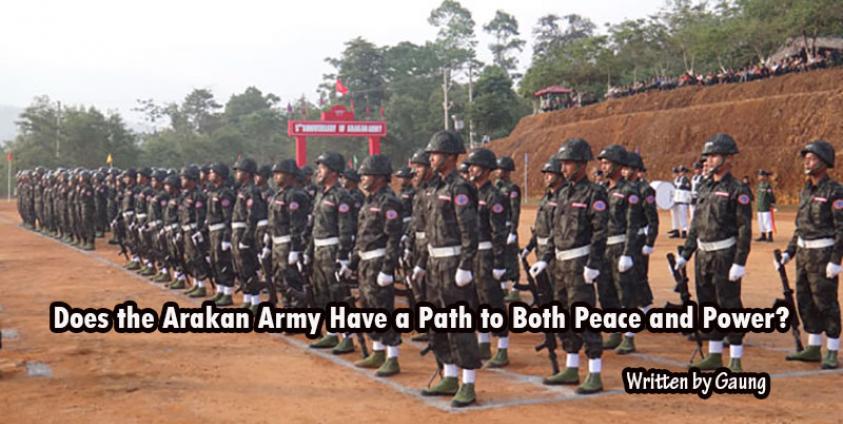For generations, Burmese authorities have monopolised ethnic areas with the words, “Non-disintegration of the Union and non-disintegration of national unity.”
For example, jade and gold are mined in Kachin State. Arakan State produces oil and gas. However, local people in these states are suffering from poverty and see very little of the benefits that their natural resource endowments should offer them.
Myanmar has had a tumultuous seven-plus decades since gaining independence in 1948, in many cases due to the monopolisation of national interests under successive central governments.
Armed organisations representing ethnic minorities such as the Kachin, Karenni, Karen, Mon and Shan have been fighting for greater autonomy for generations, demanding equal rights and self-determination for all ethnic groups.
In western Myanmar, those goals have been most effectively advocated by the Arakan Army (AA), which is among the youngest of Myanmar’s ethnic armed groups.
The dream of AA leaders — to achieve confederate status for Arakan State — is a big dream, and it is compatible with the Arakanese people as well. In a confederacy, principles of self-governance dictate matters pertaining to business, taxes, education and much more.
The Wa region is often held up as an example, because it is independent of the mainland in most respects. The Wa region has its own military, administration, judiciary and tax collection system.
The Wa Self-Administered Division offers a template for what a confederate reality could one day look like for Arakan State, with concrete examples to help further understanding among the people of Arakan State.
War and Peace
Two years of frequently intense conflict between the military and Arakan Army came to an end with an informal ceasefire toward the end of last year. AA leaders seem to have figured out that the revolutionary path requires more than military force alone.
The Arakan Army has been empowered to revive Arakanese nationalistic spirit. Currently, the Arakan Army is building on the cultural, linguistic, literary and historical identities that bind the people of Arakan State.
In addition, the Arakan Army has been conducting training courses on administration, the judiciary and policing, as well as offering vocational training courses on computer skills and English proficiency for young people in AA-controlled areas. Such activities are said to be part of a “soft revolution” in Arakan State.
The Arakan Army is also expanding its territorial control and stockpiling weapons as needed. The Arakan Army was able to recruit and mobilise among all ethnic groups in Arakan State, not only the Arakanese.
Political Considerations
National political standing is a key requirement for the confederation that the Arakan Army wants. It is also important that the Arakan Army and the Arakanese people be united.
The Arakan Army has been able to stand on an equal footing with other powerful ethnic armed organisations (EAOs) due to the fact that local people and civil servants in Arakan State have been involved in politics since the end of the war.
The people of Arakan State, including the Arakanese, Thet, Khami, Mro, Daingnet, Kaman and Maramargyi, have all participated in the revolution, directly or indirectly. In addition, Muslims in Arakan State also assisted in the revolution.
This is a politics in which people from all walks of life can participate, and the Arakan Army is currently guiding the popular will.
The United League of Arakan and Arakan Army (ULA/AA) are leading the Arakanese people, and on the other hand, Arakan party politics is fading.
The Arakanese people are losing interest in the current party politics. Daw Aye Nu Sein, a senior member of the popular Arakan National Party (ANP), joined the military council not long after the February 1 coup. The leader of the Arakan Front Party (AFP), Dr. Aye Maung, has also been criticised for working with the military council.
Arakanese people increasingly trust the Arakan Army in part because of their frustrations with the divisiveness of party politics, as both inter- and intra-party disputes have been on full display in the coup’s aftermath.
The military regime is struggling with political upheavals of its own making, with various factions across the country using all available means and tactics to resist junta rule. In light of these developments, the Arakan Army is taking a stand.
The Myanmar junta is increasingly tired of using force against powerful EAOs and the recently formed People’s Defence Forces (PDFs) that have won over recruits as a revolutionary force across much of the country. The Myanmar military is stretched unlike ever before as it battles enemies in the mountainous border regions as well as the central lowlands.
If the military wants a strong path to peace with the Arakan Army in the future, it will have to negotiate a separate confederation for the Arakanese people under the ethnic armed group’s leadership.
But because the confederacy is seen as separate from the Nationwide Ceasefire Agreement (NCA) process, an important question remains whether the Myanmar military can accept a confederate Arakan.
Written by Gaung



